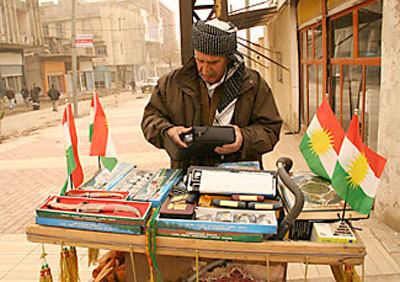
A renowned and experienced Swedish diplomat by the name Ingmar Karlsson has recently been the top news in Sweden.
Some angry bloggers and newspaper columnists want him fired and some cheer him on. The reason has got nothing to do with his diplomatic work. It has to do with his latest book: Kurdistan, a country that is not (Kurdistan, landet som icke är).
The title of the book (beside Kurdistan) is derived from a Swedish poem about a wonderful place that exist only in dreams and not in reality.
The book starts by telling the history of the Kurds from a couple of thousand years a go. There is not much known about antic Kurds beside some reference to them by kings or historian of other civilisations and that their ancestors are supposed to be the Medes.
The book then divides the Kurds into different religious, lingual and tribal groups. Different religious groups of kurds are: Sunni, Shia, Yazidie, Alevit, different Sufi orders, Zoroastrian and if you really bend it Jews (if there are any left). Some of these groups hate and detest the other group/s.
Different Kurdish languages are Kurmanji, Sorani, Zaza (according to wikipedia this is really Gilaki and not kurdish) and Luri, some of them are close and understandble in between and some aren’t.
Main Kurdish tribes are Kurmanji, Sorani, Zaza(again they are called Gilakis on Wikipedia), Lur, Kermanshahi and Feyli. Many of these tribes are made of smaller tribes themselves.
The kurdish history continued into modern time. The author split the modern history in to 5 chapters Turkey, Irq, Iran, Syria and Kaukasus. Here the reader can follow the pain of treason of Kurdish leaders, powerful allies like England and USA and commitment between the countries in the middle east that ensured Kurds did not have a country of their own or even treated equal as other citizens of the countries they live in.
The author did not go so easy on the Kurds either. He brands the PKK movement as a barbaric terrorist group that have the blood of many Turks and Kurds on their hands and that has to be beaten. He described the administration of Iraqi Kurdistan as corrupt and having the same lack of freedom as Saddams Iraq with many people getting killed or vanishing.
So finally Mr Karlsson made the conclusion that Kurds do not have much in common to unite in a single country. Also the leaders of Iraqi Kurds know that if they try to work for a total autonomi from Iraq they will lose the support of USA and Israel. And finally the Kurds in Turkey try to get Turkey in EU so to get attention on human rights and their situation. So the Kurds should stop glorifying a country that is not and should
work and fight for their rights and advancement in the countries they
are citizens of.
Beside small misstakes here and there the book is a good (but dry :)) read and I accept Mr Karlssons arguments. He has all the facts, he uses them well. Since the release of his book Mr Karlsson has been under heavy fire.
Kurds have been in Sweden since the 60s or 70s. They started to come as simple workers but now the second and third generation are well integrated and hold many key positions in the society. Especially Kurdish women have been very successful as politicians and debaters. One of the reason being many honor killings that happened during 90s and lead to more political support for Kurdih women.
Historically most of the Kurds in Sweden belong to socialist parties like the socialdemocrats or the communist party. But the second and third generation tend to move to the right like liberals (folkparti) or conservatives(moderater).
Especially members of the last two groups mentioned are a hard opponents to Mr Karlssons book. They call the book full of lies, they call its writer agent of Turkey. They say that all Kurdish people are united for a “free” Kurdistan. These people are heavy supporters of Israel and US war in Iraq.
The voices from the Kurdish left has been positive on the book. Not that they accept the situation of the kurds in the region, they argue that Kurds must accept many of the facts in the book and they must also share the blame for the situation they are in.
For me it is interesting to read and follow different countries around ours and many people in and around our country to understand our situation better.
We Iranians do also have a country that is not. Especially the Iranians that are pro Bush and Israel, do hold this Iran very high. That Iran is an Iran with no Islam and Mullahs and for the blame for “the country that is” goes to Arabs, Bris and Americans (paradox.. ehheemm).






